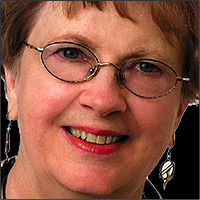Dr. Katharine Le Mée
// Author & EducatorDR. KATHARINE LE MÉE is an author and educator from Englewood, New Jersey. Her book “Chant: The Origins, Form, Practice, and Healing Power of Gregorian Chant” (1994) is available from Amazon.com, and “The Benedictine Gift To Music” (2003) is available from Paulist Press. Katharine Le Mée holds a Ph.D. in Romance Philology from Columbia University, and has studied and performed the monophonic and polyphonic music of the Middle Ages.
Website: www.lemeestudies.com
Photo: Katharine Le Mée / LeMeeStudies.com
Interview:
Music can produce a very powerful vibration, for better or for worse. The listener is placed right in the middle of what is a three-dimensional experience, with sound all around. The experience is not at all like that offered by a visual image, where the viewer is much more an observer than a participant. Whenever people listen to music they have made a choice as to what drummer they will listen to and will need to accept the possibility of powerful consequences that will ensue. Music is causative, creating effects in body, mind, and spirit. Some music leads to a deepening of spiritual life; other music has just the opposite effect.
Music that could be called “spiritual” has the effect of making the transcendent perceptible. It draws us into the present, the only place where God can be found, and focuses our attention away from our personal ego and from “business as usual”. It quiets us down, awakens our spiritual powers, and opens our hearts. A musical form such as Gregorian chant has retained its significance over more than fifteen-hundred years because it reminds us of the fact that life as experienced through the senses is designed to teach us about, and lead us to, a world beyond, which is eternal and more real.
“Music is causative, creating effects in body, mind, and spirit. Some music leads to a deepening of spiritual life.”
– Dr. Katharine Le Mée, author of “Chant: The Origins, Form, Practice, And Healing Power Of Gregorian Chant”


